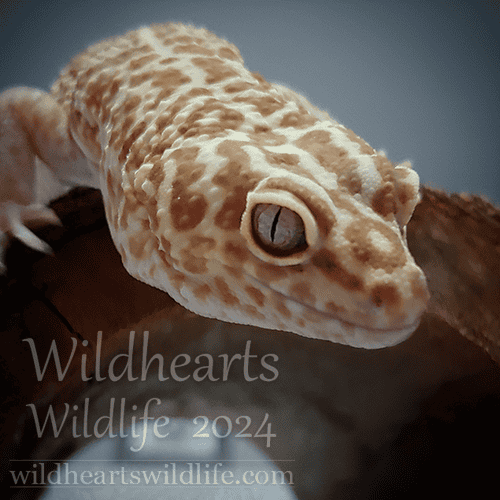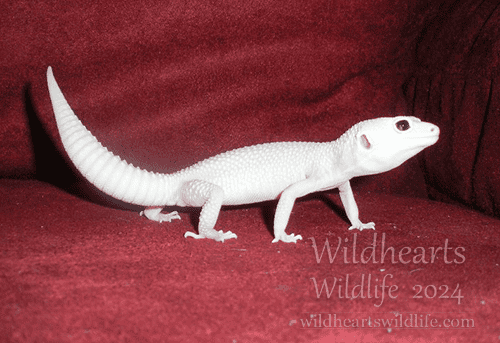On September 19th 2024, my oldest pet, Aurora the leopard gecko, celebrated her 16th hatch day! I find it funny that I have a little gecko that is older than a few of my nieces. Every year, on Aurora’s hatch day, I play the role of annoying aunty and send them a picture of Aurora with the message that “this gecko is older than you are!”. You wouldn’t know Aurora’s age by looking at her, though! At sweet 16 she looks just as vibrant as she did as a much younger gecko, or at least I think so.
Thankfully it’s not only looks either. Aurora, all around, seems to be doing quite well. She still eats well (a little too well sometimes, she’s actually currently on a diet), and enjoys exploring. So how many happy years do I have left with my oldest Wild Heart? How long do leopard geckos live?

The Oldest Leopard Gecko Alive
Accounts of the oldest ever leopard gecko seem to vary. From what I could find, the current oldest leopard gecko is named Großmütterchen, and lives with her owner Esther Laue in Germany. Reptifiles featured Großmütterchen on their Facebook page in December of 2019, where she was reported to be 40 years old at the time!
Average Leopard Gecko Lifespan
Reporting the average lifespan of any species of animal can be difficult since lifespans can vary so drastically. As care standards improve, exotic pets like leopard geckos are living longer and longer in captivity!
I’ve seen reports of the average leopard gecko’s lifespan vary from 6 – 10 years on the low side, all the way up to 15 – 25 years on the higher side. Then, of course, you have everything in between! Some geckos, for one reason or another, die young, while others, like Großmütterchen, set records.
After speaking to countless owners over the years, it seems like it is not all that unusual for well cared for leopard geckos to make it to around, at least, 15 to 25 years! I have no doubt that their increasingly impressive lifespan has to due, at least in part, to improving care standards.

Factors That Can Impact Your Gecko’s Lifespan
Like with people, no two geckos are exactly the same. There are so many different factors that could impact how long an individual leopard gecko lives.
- Enclosure Set Up: Where your leopard gecko lives is super important! Providing them with large, mentally and physically stimulating, enclosures can help them live longer. Things like proper heating, day/night cycles, and humidity are really important too!
- Diet: A healthy, varied, species appropriate diet, can go a long way towards helping your gecko live a long, healthy life.
- Supplementation: Species appropriate supplements can help fill in any nutritional gaps, and keep your reptile healthy.
- Veterinary Care: Access to a reptile experienced vet can help keep your gecko healthy and deal with any issues that come up during their lifetime.
- Stress Level: Stress isn’t good for anyone, reptiles included. Keeping their lives as stress free as possible may help enhance their longevity.
- Genetics: Sometimes lifespan is just luck of the draw. An animal’s genetics can play a role in how long he or she lives. Certain morphs, for example, may come with genetic health issues that impact their lifespan.
- Sex: Male geckos, in general, are thought to live longer than females. This is due to the fact that producing eggs throughout their lives can be draining on a female leopard gecko’s body.
- Luck: Sometimes, when it comes to lifespan, it can just come down to the luck of the draw.
Long Live Your Gecko!
I certainly hope that my two leopard geckos, Aurora and Miyuki, enjoy long, happy lives. Aurora is probably one of my sweetest reptiles, and I certainly hope she’s around for many years to come. She’s so sweet, in fact, that she’s my “go-to” reptile when a child or someone perhaps a bit nervous about handling reptiles asks to hold one of my critters.
If you keep leopard geckos, how old is your oldest? Feel free to share more about them by contacting us, or posting on one our various social media pages (links are on our sidebar to the right).
———————
Unfortunately, Wild Hearts Wild Life has been dealing with content scrappers stealing our content and posting it to other websites without permission. If you’re seeing this article posted anywhere besides wildheartswildlife.com it means you are seeing it on a content scalper’s site. Please consider contacting us to let us know, and stopping by to visit on our actual site! Thank you!
